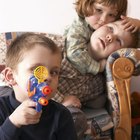
Children's minds need stimulation, even when an illness leaves them bedridden. Fun and educational activities help stave off the boredom many kids will naturally feel when stuck in bed away from their friends. By providing options for children to choose from, caregivers can keep children busy and productive during both long and short convalescences.
Books
Cozying up with a good book can get children lost in another world of imagination and educate them at the same time. Read right along with your child for a bonding experience, with both of you creating voices for the various characters. Children also have the option of reading silently on their own if they are craving quiet, and older kids may find puzzle and quiz books to be just what the doctor ordered.
Games
A game of Monopoly for older children, or Candyland for the younger set, is both fun and interactive. Games also serve as a bonding experience between parent and child. If you have a deck of cards, War or Go-Fish are old favorites and simple to play. Modern technology also comes into play, as hand-held video games like a Nintendo DS or computer games that can be played on a netbook or laptop can keep a child entertained for hours.
Crafts
Fun arts and crafts can bring out your child's creative side. There are various crafts that do not involve glitter or glue, which would be messy in a bed. Girls can make beaded necklaces or friendship bracelets to give to classmates once they return to school; friendship bracelet kits are available from stores like Walmart or Target. Boys can make paper cars or airplanes, and younger kids are often happy with a simple coloring book and crayons.
Puzzles
Small board and block puzzles keep younger children busy, while older children are entertained by jigsaw puzzles. You can do the puzzles with your child or leave him on his own to create something to be proud of. Puzzles stimulate and stretch the brain and are considered educational toys because they help children hone their problem-solving skills.
Related Articles

Gifts for Kids With Cancer

How to Plan Fun Activities for Kids

Birthday Gifts for Two Year Old Boys

Preschool Activities for Teaching ...

Birthday Gift Ideas for a 71-Year-Old

Wednesday Night Church Activities for ...

Children's Activities for the Parable ...

Examples of Family Involvement ...

Fun Two Person Sleepover Ideas

Ideas for Lessons on Teaching a ...

Kids Worship Activities

Fun Devotion Games

Valentine's Day Party Games for School- ...

Butterfly Birthday Party Games

Funny Letters to Write Your Children at ...

Adult Activities to Do at Home

Church Retreat Ideas for Children

Sober Grad Night Activities

Mother's Day Sunday School Lessons

Bridal Shower Games for Kids
References
Photo Credits
Jupiterimages/Goodshoot/Getty Images